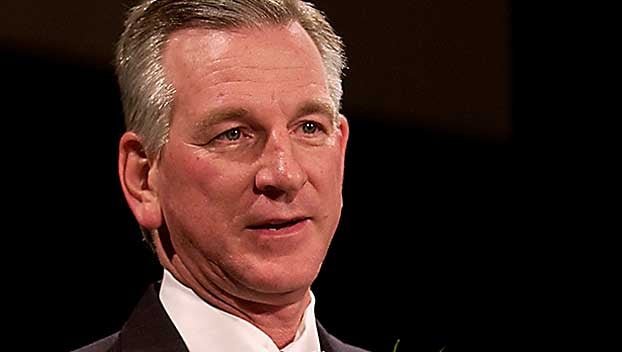Tommy Tuberville wins Alabama Senate GOP primary, defeating Jeff Sessions
Published 10:14 pm Tuesday, July 14, 2020
Former U.S. Attorney General Jeff Sessions lost the Republican nomination for his old Senate seat in Alabama to former college football coach Tommy Tuberville on Tuesday, likely ending a long political career with a bitter defeat egged on by President Donald Trump.
Tuberville, 65, beat Sessions in Tuesday’s Republican runoff as Sessions fell short in his attempted comeback for a seat he held for two decades before resigning to become Trump’s attorney general in 2017.
Familiar to Alabamians from his decade as Auburn University’s head football coach, Tuberville is now positioned for a robust challenge against Democratic U.S. Sen. Doug Jones. With Alabama’s strong GOP tilt, the seat is widely viewed as Republicans’ best chance for a pickup as they try to maintain their thin Senate majority amid Trump’s lagging popularity nationally.
Sessions, 73, was wounded by Trump’s criticisms after he recused himself in the investigation into Russian interference in the 2016 presidential campaign. The first U.S. senator to endorse Trump during the GOP presidential primary campaign, Sessions insisted throughout the campaign and again Tuesday night in defeat that he was required by law to recuse because he was a potential subject and witness given his campaign ties to the president. “Let me say this about the President and our relationship: I leave with no regrets,” Session said on a small stage at a Mobile, Alabama, hotel, with his many grandsons looking on. “I was honored to serve the people of Alabama and I was extraordinarily proud of the accomplishments we had as attorney general.” He repeated that he was right to step away from the investigation. “I did the right thing and I saved the president’s bacon in the process. Any other action to try to squelch an investigation in that environment would not have worked,” he said, adding that it ultimately led to Trump’s exoneration. “I leave elected office with my integrity intact.”
Sessions was gracious to Tuberville, as well, pledging he’d work to help defeat Jones. “He is our Republican nominee,” Sessions said. “We must stand behind him in November.”
Yet Sessions’ statements of loyalty to Trump and the party have never been enough for the president, who endorsed Tuberville after Alabama’s March primary. Trump declared on Twitter at the time that Sessions had “let our Country down” and that Tuberville would be the “true supporter of our #MAGA agenda!” He continued the broadsides throughout the primary campaign, and he crowed Tuesday evening on Twitter shortly after The Associated Press called the race for Tuberville.
“Tommy Tuberville WON big against Jeff Sessions,” Trump wrote. “Will be a GREAT Senator for the incredible people of Alabama. @DougJones is a terrible Senator who is just a Super Liberal puppet for Schumer & Pelosi. Represents Alabama poorly. On to November 3rd.”
Tuberville had willingly embraced the dynamics. Boosted by both Trump’s endorsement and name recognition from his coaching tenure, Tuberville positioned himself as a political outsider and capitalized on the president’s criticisms of Sessions, calling the former attorney general “weak” and “a disaster.”
Those digs aside, Tuberville ran a risk-averse campaign, declining media interviews and Sessions’ challenges to debate. It was enough to attract voters like Montgomery County cattle farmer Bruce Alford, who said picking Tuberville was a tough decision.
“I kind of want the new blood in, a little bit of change,” said Alford, 40. Tuberville is almost certain to face more scrutiny in a general election campaign against Jones, however, even with Alabama’s fundamental Republican lean.
Sessions tried to remind voters of his early decision to back Trump and argued he’d be most effective in advancing Trump’s agenda. He memorably took the stage with Trump at a 2015 rally at the municipal football stadium in Mobile. The event, which drew tens of thousands, stood out in retrospect as the launch of Trump’s mega-rally approach that helped propel him to the White House.
When he wasn’t defending his loyalty to the president, Sessions focused on his long history in office and questions about Tuberville’s background. “You know me. You know I can be trusted,” Sessions told voters during a recent campaign stop. That was enough to keep retired state employee Jodi McDade in Sessions’ camp. The 68-year-old said it was possible to support both Sessions and the president who detests him.
“As much a fan of Donald Trump’s as I am, he has a falling out with a lot of people that he just disagrees with,” he said. “He may be endorsing Tommy Tuberville today, but then they can have a falling out.”
Sessions, once Alabama attorney general and a U.S. attorney under President Ronald Reagan, was elected to the Senate in 1996. That first win, which came as the South continued its long shift from Democratic to Republican domination, was hotly contested. But Sessions wouldn’t be seriously challenged again in three subsequent reelection campaigns before Trump picked him as attorney general.
Despite his strength at the ballot box, Sessions was never a heavyweight in the Senate, overshadowed there and back home in Alabama by Sen. Richard Shelby, the state’s senior senator who was elected as a Democrat in 1986 and switched parties in 1994 after Democrats lost their majorities on Capitol Hill.
Shelby, who chaired a number of powerful committees over the years, has always been an eager participant in the federal budget process, steering as much money back to Alabama as possible. Sessions, meanwhile, was a budget hawk and fiscal conservative who often eschewed the back-slapping, deal-cutting ways of Washington.
For years, that made him a relative outlier on Capitol Hill. Then he found a presidential candidate who said many of the same things he’d argued for years about immigration, trade and the ways of Washington. That reality television star turned commander in chief helped raise Sessions to the pinnacle of his public life and, on Tuesday, helped bring it to an almost certain end.





